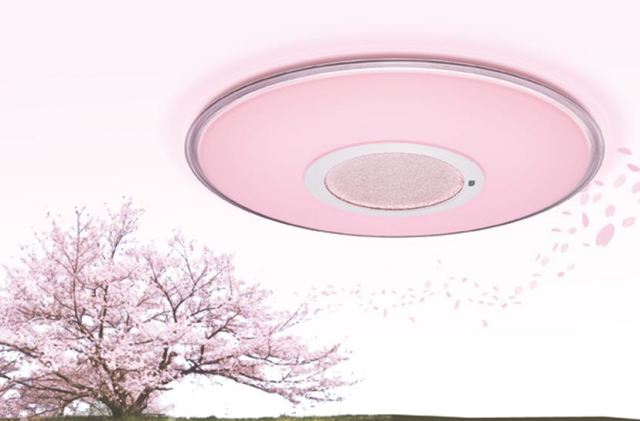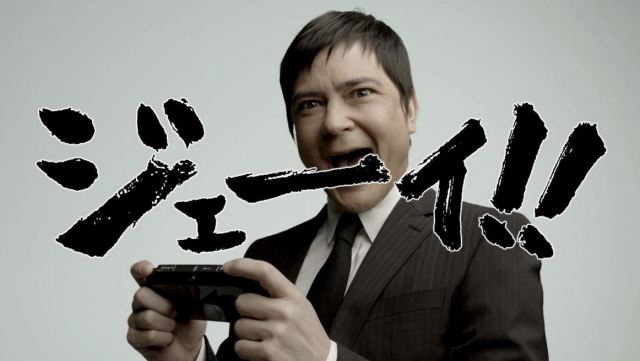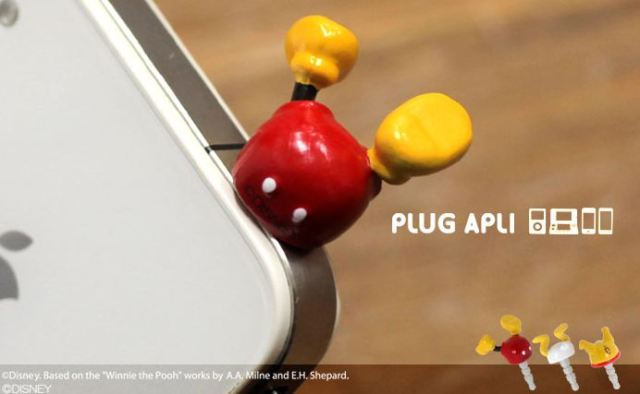The world may well be completely besotted with iPhones and Samsung-made Android devices right now, but Sony isn’t prepared to take a back seat and watch its profits and reputation go down the U-bend. In a recent conference, head of Sony Mobile Kunimasa Suzuki pledged to step up and reclaim ground lost in recent years. Rather than making unrealistic promises and declaring out-and-out war on the iPhone, however, the Japanese tech giant is keeping things realistic and is aiming at third place in the world’s mobile market.
Posted by Philip Kendall (Page 34)
With almost 40 percent of mobile phones in Japan now smart phones, people are constantly striving to find new ways to jazz up their iPhones and Android devices. As we’ve seen over the last few weeks here on RocketNews24, the popularity of character-based earphone jack plugs continues to rise, with even Disney hoping to cash in on the trend. The imaginative video game lovers over at Japan’s Gold Rush, however, have something better in mind.
We have to hand it to Sharp Electronics, no matter how many times industry pundits herald its downfall, the company pulls something innovative out of the bag. This time, the people that brought you ion cluster photocopiers and solar panel windows has unveiled a new ceiling light that it claims can actually help people in the room maintain focus while studying, and actually inspire productivity.
In by far the saddest news story of the day so far, a 38-year-old Indonesian woman has been arrested after drowning her son in the family bathtub, giving the reason that his penis was “too small” for him to possibly enjoy a happy life.
Speakers and learners of the Japanese language will no doubt be familiar with giongo and gitaigo, onomatopoeic words that are used to imitate or describe real-world sounds or sensations, respectively.
For many English speakers, sentences like “And the rain was falling like ‘tccccchhhh’, and my heart was going ‘boom boom boom,'” might come across as informal at best, or perhaps even suggest that the speaker is not especially articulate. In Japanese, though, onomatopoeia is employed far more frequently in both spoken and written communication, and this new commercial from Sony announcing a price cut for its Vita portable games console has it in droves.
For many of us in the northern hemisphere, winter is finally showing signs of packing up and leaving us alone for a while. People are starting to use their heaters less or, wear fewer layers and, if you live in a paper-thin, central heating-less house in Japan like I do, risk not putting on a woolly hat when going to bed at night.
But winter in Japan isn’t all bad! There are beautiful snow festivals and alternative snow cones to be enjoyed! And, according to a report over on Japan’s R25 news site, even wrapped up in all that winter weather gear, the nation’s ladies still manage to look so very, very cute.
A 15-year-old junior high school student in Aichi Prefecture, Japan has been arrested for the attempted murder of his father after stabbing him with a knife.
Women-only cars on Japan’s railways have existed in some form or other for more than 50 years, with “hana densha” (lit. “flower train”) carriages originally being introduced as a way of keeping female students safe from the advances of lecherous men during the peak hours. Now considered by many to be a vital part of many inner-city rail services, the train car closest to the driver’s cabin is often reserved for females only and is clearly marked both at boarding locations on the platform and inside the train itself.
Many unwitting foreign males have no doubt hopped on board these carriages during rush hours without realising it. Although foreigners usually escape relatively unscathed, when native Japanese men dare to cross that pink line and invade the sanctity of the josei senyou sharyou (women-only carriage), more often than not they are berated by the women on board until they alight or switch cars.
But is it actually illegal for a man to ride in the women-only car? Surely when other carriages are packed to the rafters, men shouldn’t be forced to squeeze in when the first car would be much less tortuous? Yahoo! Japan News spoke with legal professional Ikki Hashimoto as well as representative from Japan Rail to get the facts about men’s rights when it comes to riding the pink car.
Is your smart phone too dull? Are you constantly terrified that foreign bodies may enter its earphone jack? Disney and phone accessory experts Plug Apli have just the thing for you!
We’ve seen socket plugs before, but this is probably the first time we’ve ever been given the option to buy half a Disney character and make it look like he’s struggling to get his over-sized rear into the headphone hole…
Usually when people think of curry, the first country that springs to mind is India. But even in the land of sushi, ramen and okonomiyaki, curry and rice (or “kare raisu” as it is known here) often tops people’s lists of food favourites.
On Feb. 25, Japanese curry chain Go! Go! Curry launched its annual speed eating championship, which challenges famished food fans to consume two servings of their regular house curry and rice as quickly as possible. Unlike many eating contests where participants must simply force down as much food as possible, Go! Go! Curry’s challenge focuses entirely on how quickly diners can shovel food into their respective shout holes.
Always ready for a challenge, RocketNews24‘s eternally hungry reporter Mr. Sato grabbed his younger coworker Tashiro-kun and marched over to the branch of Go! Go! Curry nearest to Shinjuku station’s east exit to take part. Suffice to say, Tashiro-kun learned a lot during their visit. They say that every apprentice eventually becomes the master, but it’s clear that this young Jedi still has a long way to go.
The full video of the pair’s frantic face stuffing after the jump.
Commercials: a lot of celebrities in the west won’t touch them with a borrowed pole. After working hard to build up their portfolio and making themselves a household name, for many professional actors the mere thought of putting their face on an advertisement is completely abhorrent.
In Japan, however, it’s a very different story. TV celebrities, singers and sports stars are a common feature on commercials, whether they be on television, magazines or even hanging over our heads as we take the train to work each morning. Watches, skin cream, beer, anti-hair loss, cars, language courses; you name it, someone famous is smiling and pretending they love it in exchange for a few extra yen.
This time it’s the turn of hollywood heart-throb Leonardo DiCaprio to take the cash and smile for the camera. Because, as we all know, DiCaprio never shuts up about how much he loves Jim Beam whiskey usually…
Here’s a story that’s bound to ruffle a few feathers down south. According to those in the know, okonomiyaki – a savoury “pancake” dish loved by millions and one of Osaka’s most acclaimed culinary delights – may in fact have been created in none other than Tokyo.
The above pictured tweet was posted at 1:27 p.m. JST yesterday. Despite ending with a smiley emoticon, the harrowing message openly states that “a random attack” will take place at 10 a.m. on the Japan Rail Gifu station, Gifu Prefecture, at around 10 a.m. today.
As linguists and scholarly types routinely profess, language is something that is continually evolving. It is a living, breathing entity that twists, turns and grows on an almost daily basis. As our lives change, so too does language. We don’t always like the changes, but, realising that the amount of time we spend on this earth is a mere blink of the eye compared to how long language itself has existed, we come to accept that words are no more ours than the valleys and hills we trek over. (Although I must confess that I still face-palm whenever I hear someone utter the phrase “I could care less” to suggest that they do not care an iota about something.)
Nevertheless, when changes in language begin to occur, people notice them. The first time we heard the word “Facebook” used as a verb or saw our first “LOL”, many of us likely furrowed out brows and thought, “Is that right?” In much the same way, in July and August last year Japanese broadcasting giant NHK launched an online survey asking the people of Japan whether they had noticed the rather peculiar use of the word “arigatou” (thank you) cropping up in conversation in recent times.
Proving once again that Gloria Estefan was right and that the rhythm is gonna get you, Japanese DJ Kazuhiro Abo’s fantastic video shows a 10-minute session he did during visit to a kindergarten as part of a workshop appropriately titled “Kids and Music”. Although it takes the little ones a while to get moving at first, once they’re all up on their feet they’re bouncing and spinning around as only kids can do.
The full cute, chaotic video after the jump.
Just a couple of hours ago, Sony Computer Entertainment began streaming its worldwide presentation being held in New York. In it, the console giant invited dozens of acclaimed game developers to give us brief glimpses of their upcoming titles and to discuss the ethos behind the new console.
Curiously, the company did not give attendees and viewers at home a peek at the console itself – something that we’re sure will disappoint many fans – but in many respects, perhaps this is in line with Sony’s new mission statement as the company focuses less on physical hardware and more on the online interactive experience as a whole. With streaming, remote play and even the ability to watch and remotely operate a pal’s game from thousands of miles away, Sony is promising gamers “the fastest, most powerful network in the world,” and aims to bring gaming and social networks together in a big way.
As regular readers may recall, despite being a big hairy beast of an Englishman, this writer has kind of a soft spot for head spa treatments. Although I used to abhor the very thought of entering a salon and allowing a stranger to wash and massage my scalp while being surrounded by guys with floppy fringes and women having their hair dyed orange, I have become such a fan of Japanese head spas since my wife first dragged me along to try one that I now make a point of getting one every month without fail. It probably helps that it’s usually a pretty girl who’s cradling my lumpy Shrek head and running her fingernails through my hair, but it’s nothing short of bliss.
So when I caught sight of the new Mondaile Head Spa iD3 headset from Breo I was genuinely intrigued. It certainly looked futuristic enough to have the potential, but surely a pile of plastic and wires couldn’t really come close to my living, breathing masseuse’s skilled fingertips? The tech lovers over at Japan’s Web R25 put the unit through its paces and proclaimed it “a must” for gadget lovers, but judging from the reactions of at least one everyday user, the device is not without its quirks.
“Ignore the rules and you’ll get jam in your sneakers.”
The teachers may not always know about them, but throughout schools in Japan there are a number of unwritten rules that have been passed down from school generation to school generation and must be obeyed. First graders may only use the old, “haunted” toilet block nearest to the gym; only third graders may wear their backpack with just one strap; the cute art teacher must never be gazed upon by anyone other than the boys from class 2-F…
Entering a new school and being told to obey these long-standing rules “or else”, many kids probably wonder why their seniors, or “senpais“, are such jerks. But as the years go by and they, too, slowly rise to power and reap the rewards of having aged a couple of years, few are in a hurry to abolish the “ura“, or “other side”, code of conduct.
According to a report by Japan’s Yomiuri Online, however, students at a school in Tainai City, Niigata Prefecture have taken the unusual step of openly discussing these rules and swearing to abide by them no more.
Valentine’s Day. It may well be little more than an excuse for chocolate manufacturers to line their pockets, but its popularity in Japan seemingly knows no bounds. For those men in relationships, the day is usually one filled with gifts of fondue toilets and creepy girlfriend-shaped chocolates, but for the singletons out there it’s just another day to feel unappreciated.
But not these young men! Rather than spend February 14 without a little somethin’ sweet, they donned sunglasses and face masks and descended on Tokyo’s Machida station asking for chocolate donations from passers-by. And, would you believe it, they were actually kind of a hit with the ladies.
No matter how much you love someone, once you start living with them minor irritations are bound to come to the surface. The object of your affections – that perfect specimen of a human being whose every movement used to be cute, sexy or endearing in some way – suddenly becomes just another person with flaws of their own. Perhaps they slurp their coffee too loudly. Maybe they have a habit of leaving hair in the plug-hole or not changing the toilet roll when the old one is finished. These minor issues are the kind of thing that we only come to notice after the initial “honeymoon” dating period when we were always dressed to impress and only have to keep our bad habits in check for the duration of a single evening at a time.
In a recent story about marital relations, Japanese website News Post Seven heard from both relationships experts and a number of married women who were distinctly irked by their husbands’ bad habits. While issues such as of a general lack of help with the housework or cooking frequently cropped up as the cause of arguments and unhappiness, one of the most common complaints made was of husbands making as mess while peeing. Told to take a seat while draining his spuds, however, one Japanese man was seemingly morally offended by the mere suggestion, stating that to pee standing up is “a matter of honour”.










 Majority of Japanese women in survey regret marrying their husband, but that’s only half the story
Majority of Japanese women in survey regret marrying their husband, but that’s only half the story Massive manga collaboration bringing 100 years of Shueisha manga to Uniqlo T-shirts【Photos】
Massive manga collaboration bringing 100 years of Shueisha manga to Uniqlo T-shirts【Photos】 Which Japanese beef bowl chain’s near-identical demon grater onioroshi ponzu gyudon is the best?
Which Japanese beef bowl chain’s near-identical demon grater onioroshi ponzu gyudon is the best? Mister Donut and Godiva continue their sweet sweets relationship with new treats on sale now in Japan
Mister Donut and Godiva continue their sweet sweets relationship with new treats on sale now in Japan Poké Ball cakes here for limited but long time to celebrate Pokémon franchise’s 30th anniversary
Poké Ball cakes here for limited but long time to celebrate Pokémon franchise’s 30th anniversary Totoro cream puffs and Catbus cookies are finally available in downtown Tokyo
Totoro cream puffs and Catbus cookies are finally available in downtown Tokyo Japan’s foreign tourist numbers projected to fall for first time in years in 2026
Japan’s foreign tourist numbers projected to fall for first time in years in 2026 Starbucks Japan releases new drinkware and goods for Valentine’s Day
Starbucks Japan releases new drinkware and goods for Valentine’s Day Looking for a Japanese convenience store souvenir? Seicomart has a legendary hit product for fans
Looking for a Japanese convenience store souvenir? Seicomart has a legendary hit product for fans Here are the top ten foodie factory tours for the fall throughout Japan
Here are the top ten foodie factory tours for the fall throughout Japan Starbucks Japan releases new Frappuccino and latte for Valentine’s Day
Starbucks Japan releases new Frappuccino and latte for Valentine’s Day Our 52-year-old pole dancing reporter shares his tips for achieving your New Year’s exercise goal
Our 52-year-old pole dancing reporter shares his tips for achieving your New Year’s exercise goal 10 times to avoid traveling in Japan in 2026
10 times to avoid traveling in Japan in 2026 Ramen restaurant’s English menu prices are nearly double its Japanese ones, denies discriminating
Ramen restaurant’s English menu prices are nearly double its Japanese ones, denies discriminating Princess Mononoke magnets return just in time to treat yourself to awesome anime decorations
Princess Mononoke magnets return just in time to treat yourself to awesome anime decorations Giant hotel rooms in Osaka reflect the new non-niche face of travel in Japan.
Giant hotel rooms in Osaka reflect the new non-niche face of travel in Japan. Japanese women showing rebounding interest in giving Valentine’s Day chocolate【Survey】
Japanese women showing rebounding interest in giving Valentine’s Day chocolate【Survey】 Umamusume anime girl plushie recalled for having parts she absolutely should not have【Pics】
Umamusume anime girl plushie recalled for having parts she absolutely should not have【Pics】 What’s inside Starbucks Japan’s fukubukuro lucky bag for 2026?
What’s inside Starbucks Japan’s fukubukuro lucky bag for 2026? Starbucks Japan ready to get Year of the Horse started with adorable drinkware and plushies【Pics】
Starbucks Japan ready to get Year of the Horse started with adorable drinkware and plushies【Pics】 7-Eleven Japan starts new temporary luggage storage service in over 300 branches
7-Eleven Japan starts new temporary luggage storage service in over 300 branches Disillusionment at Tsukiji’s tourist-target prices led us to a great ramen restaurant in Tokyo
Disillusionment at Tsukiji’s tourist-target prices led us to a great ramen restaurant in Tokyo Starbucks teams up with 166-year-old Kyoto doll maker for Year of the Horse decorations【Photos】
Starbucks teams up with 166-year-old Kyoto doll maker for Year of the Horse decorations【Photos】 Tokyo’s Tsukiji sushi neighborhood asks tour groups to stay away for the rest of the month
Tokyo’s Tsukiji sushi neighborhood asks tour groups to stay away for the rest of the month Survey asks foreign tourists what bothered them in Japan, more than half gave same answer
Survey asks foreign tourists what bothered them in Japan, more than half gave same answer Japan’s human washing machines will go on sale to general public, demos to be held in Tokyo
Japan’s human washing machines will go on sale to general public, demos to be held in Tokyo We deeply regret going into this tunnel on our walk in the mountains of Japan
We deeply regret going into this tunnel on our walk in the mountains of Japan Studio Ghibli releases Kodama forest spirits from Princess Mononoke to light up your home
Studio Ghibli releases Kodama forest spirits from Princess Mononoke to light up your home Major Japanese hotel chain says reservations via overseas booking sites may not be valid
Major Japanese hotel chain says reservations via overseas booking sites may not be valid Put sesame oil in your coffee? Japanese maker says it’s the best way to start your day【Taste test】
Put sesame oil in your coffee? Japanese maker says it’s the best way to start your day【Taste test】 No more using real katana for tourism activities, Japan’s National Police Agency says
No more using real katana for tourism activities, Japan’s National Police Agency says Starbucks Japan reveals new sakura drinkware collection, inspired by evening cherry blossoms
Starbucks Japan reveals new sakura drinkware collection, inspired by evening cherry blossoms Updated cherry blossom forecast shows extra-long sakura season for Japan this year
Updated cherry blossom forecast shows extra-long sakura season for Japan this year Totoro cream puffs and Catbus cookies are finally available in downtown Tokyo
Totoro cream puffs and Catbus cookies are finally available in downtown Tokyo Japan’s foreign tourist numbers projected to fall for first time in years in 2026
Japan’s foreign tourist numbers projected to fall for first time in years in 2026 Starbucks Japan releases new drinkware and goods for Valentine’s Day
Starbucks Japan releases new drinkware and goods for Valentine’s Day Looking for a Japanese convenience store souvenir? Seicomart has a legendary hit product for fans
Looking for a Japanese convenience store souvenir? Seicomart has a legendary hit product for fans Here are the top ten foodie factory tours for the fall throughout Japan
Here are the top ten foodie factory tours for the fall throughout Japan Ryuk from Death Note performs Pen-Pineapple-Apple-Pen in official release video
Ryuk from Death Note performs Pen-Pineapple-Apple-Pen in official release video Does this video about an abandoned dog leave you wiping your eyes or shaking your fist?
Does this video about an abandoned dog leave you wiping your eyes or shaking your fist? 10 vegetarian foods you can order at almost any Japanese restaurant
10 vegetarian foods you can order at almost any Japanese restaurant Eat at a kotatsu while enjoying the view from Osaka’s Harukas 300 Observatory this winter
Eat at a kotatsu while enjoying the view from Osaka’s Harukas 300 Observatory this winter We try an unusual buffet of dishes made from wild game at a roadside stop in Chiba
We try an unusual buffet of dishes made from wild game at a roadside stop in Chiba New line of skirts promises to give you the slim waist and long legs of an anime heroine 【Photos】
New line of skirts promises to give you the slim waist and long legs of an anime heroine 【Photos】 Is the all-you-can-eat KFC buffet in Tokyo really as good as they say it is?
Is the all-you-can-eat KFC buffet in Tokyo really as good as they say it is?